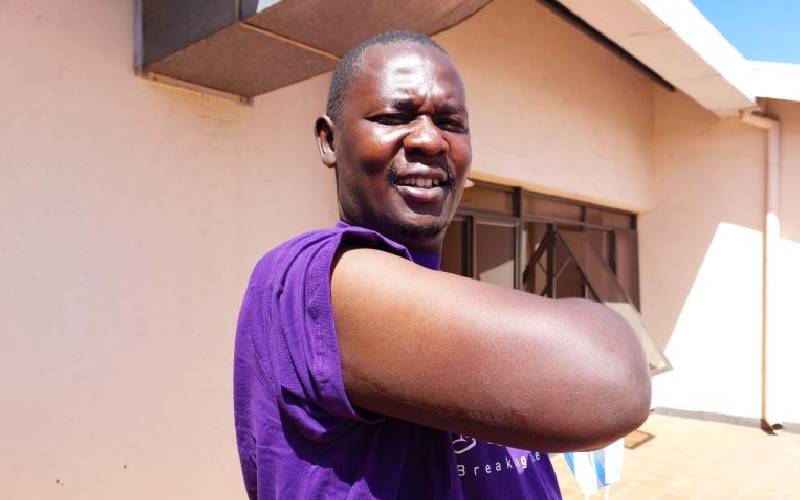
Fred Kiserem. He would suddenly fall and have seizures but did not understand what was happening. [File, Standard]
In 2011, life was pretty normal for a man with a big dream living in big cities and doing what he loves most, being a pastry chef in Iraq. Fred Kiserem would suddenly fall and have seizures but did not understand what was happening.
“A Ugandan friend of mine later told me that I could be having epilepsy and this prompted me to visit a health facility when I came back into the country,” he says.
After a series of laboratory tests, the results confirmed his fears. He was then prescribed some medicines.
“I took the medicines and returned to Iraq where I continued working for three years. I was able to request for lighter duties due to the condition. I had drugs that could last me seven months while out of the country.”
During his return stay in the country, he had another attack.
“One day I fell and broke my hand. A plate had to be put inside my arm to fix the damage. At this point in life I made a vow to help others who are living with the condition,” he says.
According to study published in 2013 in rural Kenya and other African countries, epilepsy disease is quite prominent among children and the elderly.
Epilos Musimbi the Director of Youth on the move organization that reaches out to people living with epilepsy says that a lot of people do not believe in the existence of epilepsy disease and often associate it with myths.
“There are many challenges in the country key being lack of enough trained personnel to manage the condition. Stigma is also quite high and people living with epilepsy fail to thrive in a demanding society.” Mr Sam Kiwinda, a disk jockey artist in Nairobi, has lived with epilepsy for over 30 years. He is thoughtful as he walks us down the memory lane on far he has come and what he has achieved.
“The biggest lesson in my life right now is that I am not the disease, I don’t tell people I am epileptic, rather I say I live with epilepsy,” he explains.
He says that he has had to adjust his lifestyle over the years and medicines are part and parcel of his life.
“I have been many things in my life and I am proud of all of them because epilepsy is just a small part of it.”
Epilepsy is described as a condition that affects the nervous system characterised by repetitive seizures leading to loss of consciousness.
Epilepsy prevalence
Dr Symon Kariuki an epilepsy researcher at the KEMRI-Wellcome Trust Research program says that about 50 million people in the world are affected by epilepsy and about two million Kenyans are living with it.
“In Kenya, areas along the coast are recording more cases of epilepsy due to falciparum malaria that is quite prominent in the region,” says Dr Kariuki.
A study carried out by the National Epilepsy Coordination Committee (NECC) about the epidemiological studies on the prevalence of Epilepsy in the country, shows that about 4 out of 10 people per every 1000 people in a population have epilepsy.
In high-income countries, 49 per 100,000 people are diagnosed with Epilepsy yearly, while in low- and middle-income countries record about 139 cases per every 100,000 population.
Several factors aggravate the presence of epilepsy in a population. Malaria, higher incidences of road traffic injuries, birth-related injuries among others.
“Close to 80 per cent of people with epilepsy live in low- and middle-income countries,” notes Dr. Kariuki.
To educate the masses Reverend Fredrick Beuchi the secretary-general of NECC says through programs like “Angaza Kifafa” millions of Kenyans living in the grassroots can hear about it and take the necessary precaution.
“Every year we visit at least four counties to create awareness on the condition and this year we plan on visiting Kwale, Kakamega, Murang’a, and Nakuru county.”
“It is important to train healthcare workers to handle patients living with epilepsy because that is a gap present in the country and it highly affects operations,” says Musimbi.
Kenya will joined the rest of the world on February 14 to mark International Epilepsy Day under the theme of friendship and inclusion. Until then a target to hit 50 million steps for people affected with epilepsy in the world has been set.
During the 73rd World Health Assembly (WHA) new resolutions were adopted to address the challenges and gaps in providing care and services to people living with epilepsy and neurological disorders.
The World Health Organisation called on its member states to agree to the development of an Intersectoral Global Action Plan on Epilepsy and Other Neurological Disorders.
 The Standard Group Plc is a multi-media organization with investments in media
platforms spanning newspaper print
operations, television, radio broadcasting, digital and online services. The
Standard Group is recognized as a
leading multi-media house in Kenya with a key influence in matters of national
and international interest.
The Standard Group Plc is a multi-media organization with investments in media
platforms spanning newspaper print
operations, television, radio broadcasting, digital and online services. The
Standard Group is recognized as a
leading multi-media house in Kenya with a key influence in matters of national
and international interest.











